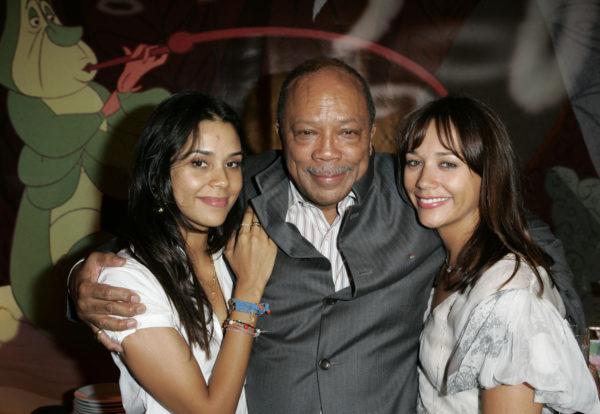Jonathan Majors’ Search for His ‘Coretta’ Dredges Up Quincy Jones’ Past Statements on Black Men Marrying White Women as an Act of ‘Freedom’ and ‘Revolution’
As the drama surrounding Jonathan Majors and the assault of his ex-girlfriend, Grace Jabbari, continues to take social media and airwaves by storm, a conversation Majors had with Jabbari, discussing his importance in Black culture and asking her to ‘sacrifice’ for him like Coretta Scott King and Michelle Obama has become center of discussion. King’s name once again was mentioned when Majors appeared on the Jan. 8 episode of “Good Morning America,” in which this time the “Creed” star said he found his “Coretta” in new girlfriend, Meagan Good.
The actor’s obsession with civil rights while in an interracial relationship sparked dialogue online about the Black male civil rights leaders and entertainers who were married to white women.
In the 1950s and ’60s, numerous Black entertainers engaged in relationships with and married white women as a means of challenging societal norms. Quincy Jones has discussed this in numerous interviews in the past. According to Jones, these interracial unions were perceived not only as acts of defiance, especially considering the existence of anti-miscegenation laws in many states, but also as a form of revolutionary expression and civil rights activism.
Kidada Jones, Quincy Jones and Rashida Jones during Disney’s Alice in Wonderland Mad Tea Party at Private Residence in Los Angeles, California, United States. (Photo by Donato Sardella/WireImage for Disney Consumer Products)
“Over the years, interracial relationships have been a hip, almost defiant thing, a way of saying ‘Nobody can put a boundary around me,’” Jones told Oprah in the October 2001 issue of O, The Oprah Magazine.
He gave a more radical explanation to GQ in 2018. When the three-time divorcee was asked about being criticized for only marrying white women, he told the publication, “I don’t give a f—k. Because they think that’s all you like, but that’s stupid, man. Here’s what you’ve got to understand: The interracial thing was part of a revolution, too, because back in the ’40s and stuff, they would say, ‘You can’t mess with a white man’s money. … Don’t mess with his women.’”
Jones continued, “It was freedom, man. Do what you want to do, and nobody can tell you what to do.”
One may consider that Jones has a point if you think back to 1884 when Frederick Douglass secretly wed Helen Pitts. Her white parents, although abolitionists themselves, disapproved of her marrying a Black man. Pitts was Douglass’ second wife. His first wife, Anna Murray, died in 1882. Pitts’ family nor Douglass’ children were accepting of the marriage, yet they rebelled anyway.
As far as entertainers, Jones wasn’t alone in this line of thinking, unfortunately. In the 1950s, before marrying her white husband Bill McDonald, singer and actress Eartha Kitt struggled to find love with Black men in her industry, namely Sidney Poitier and Harry Belafonte. She said that at the time, Black men felt that their relationships with white women came with financial and social resources and felt Black women could do nothing for their advancement in society.
“He seemed busy catching little white flies, as he proved to me later in Philadelphia, where getting up from my bed, he said, ‘I don’t want you to take this seriously. No Black woman can do anything for me,’” she wrote in her 1989 memoir “I’m Still Here: Confessions of a Sex Kitten. “Black woman would hold a Black man back’, that’s what he told me.”
Malcolm X had his views as to why some Black people chose to date outside of their race, and it wasn’t out of defiance. According to the late activist, it’s a “slave mentality” and a belief that you have not achieved success until you’ve gotten a white woman.
“The white man has brainwashed the so-called negro to the point of believing in white supremacy so much that today some negros think that that they’re not making progress or they don’t have anything unless they’re living in a white neighborhood, a seat at the white man’s school or a position at the white man’s job, they’ve even taken it so far they don’t think they’re successful in life unless they have a white woman as a wife,” he said in 1963.
Interracial marriage in the United States became fully legal in all U.S. states following the 1967 Supreme Court decision that declared anti-miscegenation state laws unconstitutional, citing the 14th Amendment adopted in 1868.
When this law was passed, according to the Pew Research Center, only 3 percent of married couples were interracial. Now, that number has ballooned to 20%.
Over 55 years after the decision, the Gallup Polls says that interracial dating has an approval rating of 94%, showing that the love shared by interracial couples may have been a contributing factor to the new America.

